You know the year has really started when the awards start coming think and fast – and so I can tell you with confidence that the year has really started! Check out all the awards announced since last post at the end of this one!
February’s figures
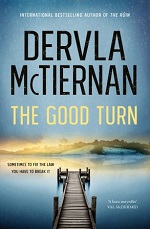 Our February figure of 42 is just a little under both this January’s and last February’s figures, which is not exactly exciting. However, there’s nothing wrong with holding steady, particularly given the summer we’ve had here downunder. Here are some statistical highlights:
Our February figure of 42 is just a little under both this January’s and last February’s figures, which is not exactly exciting. However, there’s nothing wrong with holding steady, particularly given the summer we’ve had here downunder. Here are some statistical highlights:
- Our most reviewed author was Dervla McTieran with six reviews for The good turn, closely followed by Hannah Richell with five reviews for The river home.
- Our most reviewed books were those by McTiernan and Richell, above!
- Our top reviewers were Whispering Gums (me, in fact), contributing five reviews, followed by Jennifer Cameron-Smith (GoodReads) with four reviews.
- 25% of the Literary books posted this month were categorised as Crime.
The Classics
 After a bumper crop of classics reviews posted to the challenge last month, we had just one this month – and it’s a real classic. Not only is it now over 40 years old but it has well and truly stood the test of time. It is Helen Garner’s Monkey grip, which was reviewed by Kate (booksaremyfabouriteandbest). Kate is a Garner fan, and enjoyed Garner’s description of Melbourne areas she knows. However, she prefers, she writes, Garner’s nonfiction to her fiction, saying of Monkey grip that
After a bumper crop of classics reviews posted to the challenge last month, we had just one this month – and it’s a real classic. Not only is it now over 40 years old but it has well and truly stood the test of time. It is Helen Garner’s Monkey grip, which was reviewed by Kate (booksaremyfabouriteandbest). Kate is a Garner fan, and enjoyed Garner’s description of Melbourne areas she knows. However, she prefers, she writes, Garner’s nonfiction to her fiction, saying of Monkey grip that
there’s beauty in Garner’s simple descriptions. Of Gracie and another kid asleep, she writes that Nora finds them ‘…cast across the bed in attitudes of struggle and flight’. But these lovely slips of sentences were not enough to sustain me through the relationship angst, the drug paraphernalia, and the idle days.
Crime
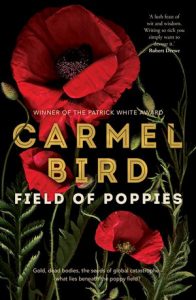 And now I move out of my comfort zone and into Crime! However, since, as is perfectly valid, our contributors do sometimes categorise crime novels as literary, it seemed time to focus on them again here. This month a few crime books were marked literary, one non-fiction book was specifically about a crime, and at one traditional literary book was marked crime! The books are:
And now I move out of my comfort zone and into Crime! However, since, as is perfectly valid, our contributors do sometimes categorise crime novels as literary, it seemed time to focus on them again here. This month a few crime books were marked literary, one non-fiction book was specifically about a crime, and at one traditional literary book was marked crime! The books are:
- Carmel Bird’s Field of poppies
- Chloe Hooper’s The arsonist (non-fiction)
- Dervla McTiernan’s The good turn
- Heather Rose’s Bruny
- Emma Viskic’s And fire came down and Resurrection Bay
Carmel Bird’s Field of poppies is the literary book also marked as crime, because it contains two crimes – a robbery and a disappearance. However, there is no main detective here, private or otherwise, and the crimes though significant, are not the book’s main story or theme. Instead, this warm-hearted but pointed satirical book is about two perfectly nice, likeable people who continue to enjoy their lives while the world (our world) is dying around them. The crimes rock their boat, but do they cause them to change their ways? (See my review.)
 Emma Viskic’s novels, on the other hand, are more traditional crime novels – but they do have a difference: her detective, private investigator Caleb Zelic, is deaf. Tracey (Carpe Librum) reviewed the first two Zelic novels in February and was impressed. She wrote of the second one, And fire came down, that
Emma Viskic’s novels, on the other hand, are more traditional crime novels – but they do have a difference: her detective, private investigator Caleb Zelic, is deaf. Tracey (Carpe Librum) reviewed the first two Zelic novels in February and was impressed. She wrote of the second one, And fire came down, that
Occasionally the second in a series can fall short of the first, but this definitely isn’t the case here. In fact, I’d go so far as to say And Fire Came Down was better than Resurrection Bay. The plot was more engaging and complex, the tension was tighter, the danger was greater and the writing was better.
 Dervla McTiernan’s The good turn is perhaps even more traditional, making me wonder why it has been flagged literary which, in terms of genre books, usually suggests some departure from the genre. However, it seems that – and this is perfectly valid too – McTiernan does her genre really, really well. I’ll share just two of the four reviewers this month, reviewers who don’t often appear in my round-ups but are stalwart contributors to the challenge. First, is Shelleyrae (bookdout) who talks of the novel’s “stellar characterisation” and says the “pacing of the concurrent story threads … is perfect”. And second is Bree (1girl2manybooks) who calls it “the perfect crime novel” and says, pretty much echoing Shelleyrae’s praise of the multiple storylines, that “All of the separate stories came together really well…effortlessly actually.”
Dervla McTiernan’s The good turn is perhaps even more traditional, making me wonder why it has been flagged literary which, in terms of genre books, usually suggests some departure from the genre. However, it seems that – and this is perfectly valid too – McTiernan does her genre really, really well. I’ll share just two of the four reviewers this month, reviewers who don’t often appear in my round-ups but are stalwart contributors to the challenge. First, is Shelleyrae (bookdout) who talks of the novel’s “stellar characterisation” and says the “pacing of the concurrent story threads … is perfect”. And second is Bree (1girl2manybooks) who calls it “the perfect crime novel” and says, pretty much echoing Shelleyrae’s praise of the multiple storylines, that “All of the separate stories came together really well…effortlessly actually.”
If you would like to read the reviews posted of any of the books I’ve listed above, please use our Book Search page, as I now need to move on!
Awards News
Four Awards made announcements this month – from longlists to winners.
ACT Book of the Year
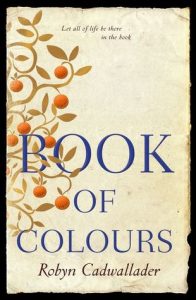 The ACT Book of the Year, recognising ACT-based writers, was announced on 28 February, with the winner being Robyn Cadwallader’s historical fiction novel Book of colours, a book which has been well reviewed by the challenge, particularly after the success of her first novel, The anchoress.
The ACT Book of the Year, recognising ACT-based writers, was announced on 28 February, with the winner being Robyn Cadwallader’s historical fiction novel Book of colours, a book which has been well reviewed by the challenge, particularly after the success of her first novel, The anchoress.
Adelaide Festival Awards for Literature
The shortlists for the multi-category biennial Adelaide Festival Awards for Literature were announced in mid-December, so slipped through the cracks here due to January’s post being a major end-of-year round-up. So I will just share the Fiction shortlist which is the one most relevant to this Literary and Classics corner of the Challenge. Four of the six shortlisted fiction books were by women:
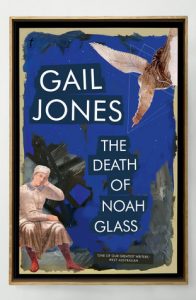 Shokoofeh Azar’s The enlightenment of the greengage tree
Shokoofeh Azar’s The enlightenment of the greengage tree- Gail Jones’ The death of Noah Glass
- Jennifer Mills’ Dyschronia
- Suneeta Peres da Costa’s Saudade
All have been reviewed for the challenge! And the winner – announced on 29 February during Adelaide Writers Week – is Gail Jones’ The death of Noah Glass.
ABIA Awards Longlist
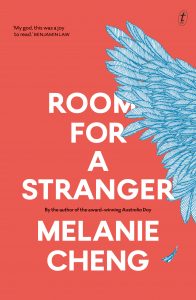 The longlist for the multi-category ABIA Awards were announced in early March, and, as is my practice, I’m just sharing the Library Fiction longlist, of which 7 of the 8 are by women. All have been reviewed for the challenge:
The longlist for the multi-category ABIA Awards were announced in early March, and, as is my practice, I’m just sharing the Library Fiction longlist, of which 7 of the 8 are by women. All have been reviewed for the challenge:
- Melanie Cheng’s Room for a stranger
- Favel Parrett’s There was still love
- Leah Purcell’s The drover’s wife
- Carrie Tiffany’s Exploded view
- Lucy Treloar’s Wolfe Island
- Tara June Winch’s The Yield
- Charlotte Wood’s The weekend
Stella Prize Shortlist
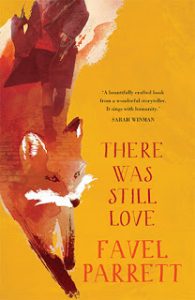 The Stella Prize shortlist was announced on 6 March, and settled, really, into something more “usual” after a rather eclectic, but interesting longlist. The six books are three novels, two memoirs, and one short story collection.
The Stella Prize shortlist was announced on 6 March, and settled, really, into something more “usual” after a rather eclectic, but interesting longlist. The six books are three novels, two memoirs, and one short story collection.
- Jess Hill’s See what you made me do (memoir)
- Caro Llewellyn’s Diving into glass (memoir)
- Favel Parrett’s There was still love (novel)
- Josephine Rowe’s Here until August (short stories)
- Tara June Winch’s The yield (novel)
- Charlotte Wood’s The weekend (novel)
Two of these have not yet been reviewed for the challenge: Jess Hill’s See what you made me do, and Josephine Rowe’s Here until August. Are there any memoir or short story lovers out there who would like to support the challenge by reading and reviewing these books?
The winner will be announced on 8 April.
———————
About Me
I am Whispering Gums and I read, review and blog about (mostly) literary fiction. It was reading Jane Austen when I was 14 years old that turned me on to reading literary fiction/classics, which is why I am here today doing this round-up! Little did Jane know what she started!
My love of Aussie literature started with Banjo Paterson’s ballads and Ethel Turner’s Seven Little Australians in my childhood. But, I didn’t really discover Australian women’s writing until the 1980s when I fell in love with Elizabeth Jolley, Thea Astley, Olga Masters, Helen Garner and Kate Grenville. Ever since then I have been included a good percentage of Australian (and other) women writers in my reading diet.





Arghhh! Forgot to add my review for Here Until August (which I loved)! And currently reading See What You Made Me Do – so the gaps will be filled by your next roundup.
Excellent Kate – I had a feeling you’d read them and did wonder. I look forward to seeing them next month.